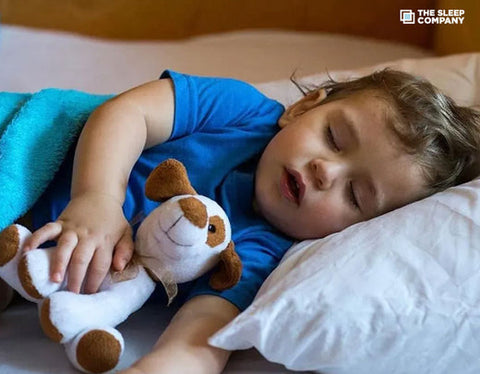My Cart

How Kids Sleep Habits Affect Academic Performance

You probably remember how, as a child, you were told to relish a good night's rest before any exam or a big event at school. This is a classic advice that's been passed down for generations. Why? Because the importance of sleep goes beyond mere relaxation. Infact, it plays a crucial role in cognitive performance and brain development.
However, children today are failing to get proper sleep. The reasons can be plenty. It can be an uncomfortable kids' mattress, too much screen time, or even stress and anxiety.
In the below article, we bring you all the information you need. We talk about how kid's sleep habits can affect their academic performance, what you can do as a parent to help out, and more. So, let's dig deep.
How Much Sleep Does Your Child Need?
Take a look at the table to get an idea of how much sleep your child needs according to their age. Anything less than this can lead to fatigue, difficulties in concentrating, mood swings, and can negatively impact your child’s overall health and academic performance.
| Age Group | Recommended Sleep Duration |
|---|---|
| Newborn (0–3 months) | 14–17 hours |
| Infants (4–12 months) | 12–16 hours (including naps) |
| Toddlers (1–2 years) | 11–14 hours (including naps) |
| Preschoolers (3–5 years) | 10–13 hours (including naps) |
| School-age (6–12 years) | 9–12 hours |
| Teens (13–18 years) | 8–10 hours |
The Link Between Sleep and Brain Function
When it comes to proper childhood development, sleep is a priority because it affects how children's brains grow and function.
During sleep, kids go through different stages, including non-rapid eye movement (NREM) and rapid eye movement (REM) sleep. Each stage is important because it impacts brain function. For instance, REM and NREM sleep help with learning and memory. Slow wave activity (SWA), a type of brain wave during deep sleep, is linked to brain development.
Infact, studies have also found that children who nap have a larger hippocampus, a brain region important for memory. This suggests that naps, mainly sleep, might be beneficial for brain development.
Sleep is also thought to play a role in brain plasticity, which is the brain's ability to change and adapt. This is important for learning and development.
So, as you can see, healthy sleep is essential for cognitive development in kids.
Signs of Sleep Deprivation in Children
Here are some common signs of sleep deprivation in children.
- Irritability
- Frequent tantrums
- Unable to focus on tasks
- Falling asleep during the day
- Experience headaches
- Changes in appetite
- Decline in academic performance
- Hyperactivity
- Difficulty waking up
- Bedwetting
How Does Your Child’s Sleep Habits Affect Academic Performance?

Here’s how your little one’s sleep habits can impact their academic performance.
1. Concentration and Focus
Even as adults, we have all experienced firsthand how sleep makes a difference. When you are well-rested, productivity improves. You seem happier and can bring a razor-sharp focus to everything you do.
The same way, when your child enjoys a good night's rest. It enhances their ability to concentrate in class and complete tasks on time. On the other hand, lack of sleep can lead to distractions and difficulty maintaining attention.
2. Memory and Learning
Sleep helps consolidate memories. So, let's say your teenager has an exam tomorrow. They were up and about trying to grasp every piece of information. While doing this, sleep took a backseat.
However, children require proper slumber to retain information learned during the day. Insufficient sleep can hinder their ability to recall facts and perform well on tests. It’s almost like it makes the mind foggy and they tend to forget things.
3. Reaction Time
Improper sleep means your child's reaction time becomes slow. They take longer than usual to grasp lessons at school. It makes it difficult for them to process the information, analyze and store it. This is when a gap appears.
When your child is unable to understand what's being taught, it can make it difficult for them to bring their A-game during exams and tests, and even lead to poor grades.
4. Mood and Behavior
Children who sleep well tend to have better moods and fewer behavioral issues. It's the same with adults too, isn't it? Getting a good night's rest just fills you with a positive feeling.
That said, sleep deprivation can lead to irritability. And, when it is not combatted in time, it can also lead to mental health issues where your child can develop anxiety and stress early on. It negatively affects them and impacts their performance in school.
5. Creativity
Sleep nurtures the creative mind. It helps your child think on their feet and makes them well-versed in finding solutions to almost any problem.
When children enjoy a peaceful shuteye, they are better equipped to tackle challenges and think critically both in and outside their studies.
6. Sequential Thinking
School is a mix of academics and extracurricular activities. And, as a parent, you want your child to perform well in every aspect. But without proper sleep, it can become difficult.
Sleep ensures your child is able to remember all the steps and series. For instance, it can be a number of steps in a math problem, or playing the series of right notes on a musical instrument is only possible with a good night's rest.
7. Physical Health
Lastly, good sleep is important for overall health. It boosts their immune system and curbs the risk of illnesses that could lead to school absences. To put it simply, good health can play a major role in success.
That's not all. Healthy kids can easily participate in activities, both academically and socially. It not only helps them develop their interpersonal skills but also enhances teamwork, their ability to communicate well, etc. These skills are essential for building friendships and achieving success in school.
What Are The Common Causes Of Sleep Deprivation In Children?

Did you know? Almost 31.2% of children experience sleep deprivation. Here’s why!
1. Improper Sleep Environment
One of the main elements that ensures a comfortable sleep is a mattress and bedding. An uncomfortable mattress can hamper their sleep quality. That's why it is crucial to invest in the best mattress for kids that's curated just for them.
This offers the necessary comfort and support your little one needs and helps them rest well. Also, loud noise, too much light, or improper room temperature can disrupt sleep. That's why a healthy sleep environment is necessary.
2. Not Having A Regular Sleep Schedule
We all have an internal clock that helps us sleep and wake up on time. Even your child has one. So, when they wake up and sleep on a regular schedule, this clock works like a well-oiled machine. However, if this schedule is disrupted, things may take an adverse turn.
An irregular sleep schedule makes it harder for your child to fall asleep and feel rested in the morning. This irregularity can also lead to sleep deprivation and affect their mood and performance at school.
3. Too Much Screen Time
While technology opens new doors, it is also a hassle because it can lead to excessive use of phones, tablets, and computers, especially before bedtime. If your child does this, it can disrupt a child's sleep.
The blue light emitted by screens can interfere with the production of melatonin, which is a hormone that helps regulate sleep. Also, stimulating content before bed keeps the mind active. So, make sure you shut down your electronics at least an hour or two before bed.
4. Food Habits
What your child consumes can be linked to their sleep. For instance, caffeinated beverages, such as sodas, energy drinks, or even chocolate, can make it challenging for children to fall asleep.
You can always have an honest conversation with your child to help them understand the adverse effects of certain food items and when is the best time to enjoy them. Even eating too much or too little can make it difficult to fall asleep. That’s why a balanced meal is important.
5. Stress and Anxiety
Stress, anxiety, or depression is not something only adults suffer from. Children are also susceptible to them. The academic pressures or problems in friendships can make it difficult for your child to relax and unwind, which interferes with sleep.
Even a jam-packed schedule can lead to exhaustion and even contribute to stress,
Here, it is always best to offer a supportive environment where they feel safe to talk to you about anything. Also, make sure your child has enough time to relax and do things they enjoy every day.
How to Establish Healthy Sleep Habits in Children?
Take a look at a few sleeping tips to help you establish healthy sleep habits in your child.
- Come up with a realistic and consistent bedtime routine.
- Invest in a good quality kids' mattress with comfortable bedding.
- Create a calming bedtime routine, which can include listening to music, reading a book, etc.
- Make sure your child exercises every day. This can help your child feel tired and ready for sleep at night.
- If your child takes a nap during the day, make sure it’s not too long or too late in the afternoon, as this can affect nighttime sleep.
- Help your child learn simple relaxation techniques, such as deep breathing or visualization. It's great to learn them early on in life to help them relax.
Wrapping Up
As you can see, sleep is one factor that remains important throughout your life. More so as kids because it helps with growth and development.
When children get enough sleep, they not only do well academically but their overall mood and emotions improve. However, lack of sleep can have an adverse effect.
Poor sleep leads to problems like difficulty paying attention, mood swings, and even low grades in school. It hampers a child's energy levels and even makes them irritable and tired.
So, the very first step to combat this issue should be a comfortable kids' mattress designed just for them.
The Sleep Company offers the best mattress for kids, which can offer excellent support and comfort. It helps your child enjoy deep and restful sleep that's super crucial for healthy growth. Designed for growing children, this mattress improves sleep quality and boosts overall well-being.
Explore the range of Kids Mattress by The Sleep Company today and invest in your child's good health for a brighter, happier, and more energetic tomorrow!
FAQs
Sleeping is directly linked to academic performance. When students get enough quality sleep, they tend to be more focused and alert. That's not all. They can grasp and retain everything taught in the classroom because good sleep helps with memory. The recall power also goes up and students no longer take too much time learning one particular concept.
It's very simple. When you sleep, the brain gets to work. It organizes memories and strengthens connections. So, you can recall facts and concepts in a hassle-free manner. You are not only able to concentrate better but also think more clearly.
When students don’t get enough sleep, they may feel tired, irritable, and unfocused. This can lead to difficulty concentrating, remembering information, completing assignments, etc., which determines academic performance.





























































